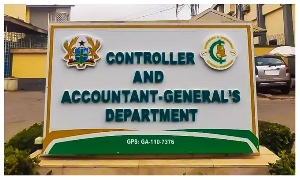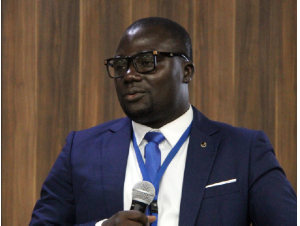Collective effort must be deepened to address the challenge of sustaining Public Financial Management (PFM) reforms across government transitions, some experts have demanded.
The charge was led by the Controller and Accountant-General (CAG), Kwasi Kwaning-Bosompem, who expressed concern that ongoing PFM initiatives often experience delays or even stall completely whenever there is a change in leadership.
While chronicling the mixed bag of results under successive reforms, he said: “One main issue we should avert our minds to, is how well we have to manage the transition from one government to another, regarding important PFM reforms initiatives that are ongoing.
“One major factor accounting for the slow pace of PFM reform achievements in Ghana is that important ongoing initiatives often suffer slow progress or sometimes a complete stoppage after a change of government. This is a key national challenge we should all work together to address,” he added.
The CAG said this during a PFM Focus Group Dialogue organised by the Association of Chartered Certified Accountants (ACCA) under the theme ‘Operationalizing PFM in Ghana: Opportunities and Challenges’.
To address this challenge, the Controller and Accountant-General emphasised the need for collaboration between the government, professional accountants, civil society organisations and other relevant stakeholders.
This collaborative approach, he argued, will not only ensure the continuity and progress of PFM reforms but also promote fiscal transparency, accountability and efficient use of public resources.
PFM chronicles
The CAG recounted systemic weaknesses identified in the nation’s PFM practices, such as lack of strategic planning, weak budgeting systems, poor compliance with regulations, ineffective expenditure monitoring and inadequate financial information for decision-making.
Consequently, the Public Financial Management Reform Programme (PUFMARP) was launched in 1995 with the aim to comprehensively address these weaknesses over a six-year period. It targeted various aspects, including budget preparation, cash management, aid and debt management, revenue management, procurement, auditing, legal framework and human resource development.
While PUFMARP had limited success, subsequent initiatives like the Ghana Integrated Financial Management Information System (GIFMIS) built upon its components. GIFMIS, launched in 2010, sought to modernise and integrate PFM processes across the public sector.
Following that, several key laws to strengthen the PFM framework, including the Financial Administration Act, Public Procurement Act, Internal Audit Agency Act, and Ghana Audit Service Act came into existence. These laws aimed to enhance financial transparency, accountability and oversight.
Additionally, there were reforms in budgeting, including introducing medium-term expenditure frameworks, shifting from incremental to activity-based budgeting, ensuring timely passage of appropriation acts and implementing composite budgets for better fiscal transparency.
Despite some notable achievements such as improved budget preparation, electronic processing of expenditures and implementation of electronic revenue systems, the PFM’s fiscal responsibility guardrails have been called into question, especially after recent growth in the nation’s debt stock and the ensuing debt restructuring quagmire.
The country’s domestic debt has surged from GH¢27.2billion in 2013 to GH¢ 194.4billion in 2022, marking an increase of 681 percent over the past decade. The figure constituted 45.7 percent of the total public debt-to-GDP ratio for 2022.
The overall public debt similarly rose by 23.7 percent from GH¢351.8billion (US$58.64 billion) at the end of December 2021 to GH¢435.3billion (US$52.33billion) by the end of December 2022.
Consequently, the nominal debt-to-GDP ratio reached 88.1 percent by the end of December 2022, up from 76.6 percent at the end of December 2021. The escalation in budget deficits has fuelled the rapid accumulation of public debt, exacerbated solvency and liquidity ratios, and drove debt to unsustainable levels.
Bank of Ghana’s (BoG) lending to the government through ways and means advances, which rose to GH¢50billion in 2022 – exceeding the threshold set by law – did little to quell concerns about the efficacy of the PFM framework.
Consolidating gains
The Project Director for PFM Reforms at the Ministry of Finance, Dr. Mohammed Sani Abdulai, said that to consolidate gains, especially in the current framework (2022 – 2026), respective stakeholders would have to buy into the idea and take ownership of the process.
“If all the relevant stakeholders take ownership of the process, then irrespective of the change in administration, these entities [stakeholders] would continue to do what they have to do for the common good,” he noted.
On his part, the Deputy Controller and Accountant-General, Dr. Edward Boateng, stated that while conditions were far from perfect, the domestic framework and the degree of continuity were significantly better than what pertains in peer nations.
Global Chief Executive of the ACCA, Helen Brand, said the PFM represented one of the most important points of concern for the association.
She pledged ACCA’s support in providing requisite skilled personnel to enable the public sector to blossom.
“There is a good phrase about business being for a purpose, not just profit. This resonates so much at ACCA, where core to our very being is the concept of public value. Public value must be the priority in our decision-making processes. Professional accountants can and will continue to make a huge contribution to the public sector by doing work I know is valuable, useful and essential,” she explained.
Business News of Wednesday, 28 February 2024
Source: thebftonline.com

















